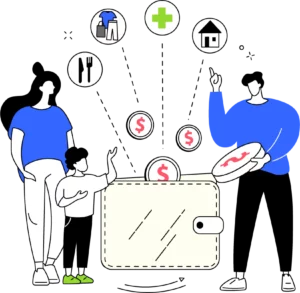For many Canadians, a garage sale is a practical and fun-filled way to clear clutter, make some extra cash, and engage with the community. This guide walks you through the entire process, from strategic planning and creative marketing to efficiently setting up and managing your garage sale. We'll also discuss post-garage sale strategies, ensuring no item goes to waste.
Whether you're a first-timer or an experienced garage sale host, our tips and tricks will equip you to maximize your earnings while minimizing stress.
The benefits of hosting a garage sale
Hosting a garage sale comes with a wealth of financial and non-financial benefits. Here's why you should consider hosting one.
Financial benefits of a garage sale
- Extra income: Hosting a garage sale is a great way to earn extra money. Your unwanted items can quickly turn into cash, which can be put towards savings, paying down debts, or funding your next big purchase.
- Savings on disposal costs: Getting rid of large, unwanted items can often involve disposal costs. By selling them in your garage sale, you can save on these expenses while making a profit.
Non-financial benefits of a garage sale
- Decluttering: Hosting a garage sale encourages you to go through your belongings and clear out anything you no longer need (Calgary Herald, 2022). This can lead to a more organized, less cluttered living space, improving your overall quality of life.
- Environmental benefits: By selling items instead of throwing them away, you reduce waste and promote reuse. This aligns with our Canadian commitment to sustainability and is a fantastic way to contribute to the environment.
- Community building: Garage sales can be fantastic community-building events. They offer a chance to meet your neighbours, engage with other community members, and foster a sense of togetherness.
The benefits of hosting a garage sale extend far beyond the financial aspect. Remember these benefits as we dig deeper into planning and hosting your successful garage sale.
Planning your garage sale

Proper planning is key to a successful yard sale. It involves deciding the date and time, collecting and pricing items, and arranging necessary supplies. Here are some steps to guide you through the planning process.
Choose the date and time
Select a date and time that maximizes your potential for traffic. Weekends, mainly Saturdays, are typically the best days for garage sales (Thorpe, 2023). Start early in the morning and plan for it to last until the early afternoon.
Gather your sale items
Begin by sorting through your belongings. This can be an excellent opportunity for thorough decluttering. Separate items into these categories: keep, sell, donate, or dispose. Remember, one person's trash is another person's treasure.
Price your items
Pricing is always the hardest part (Wheeler, 2016). The general rule is to set the price at about 10-30% of the retail price. Of course, this depends on the condition and desirability of the item. Be ready to negotiate prices on the day of the garage sale.
Collect necessary supplies
Ensure you have everything you need for the day of the sale. This includes tables or other display surfaces, price tags, signs to advertise your sale, and a cash box with plenty of change.
Plan your layout
Sketch out a rough plan of how you will arrange items at your sale. Group similar items together and place the most attractive or valuable items at the front to draw in your curious neighbours.
Check local regulations
Before you host a yard sale, check with your local city hall or homeowner's association to see if you need a permit or if there are any restrictions or guidelines you should be aware of.
Health Canada has set out guidelines for garage sale vendors, including items that can’t be sold and must be destroyed (Health Canada, 2021). Be sure to review these guidelines. You can also find more consumer product safety information here.
Marketing your garage sale
To maximize your turnout, effective marketing is crucial. This can involve traditional methods as well as online promotion. Here are some strategies to help you spread the word about your garage sale.
Traditional marketing methods
- Signs: Create visible, eye-catching signs and place them at high-traffic intersections near your home. Ensure your signs include the date, time, and address of your yard sale.
- Flyers: Design flyers and distribute them around your neighbourhood. Consider posting them at local community centres, grocery stores, and other public bulletin boards.
- Word-of-mouth: Tell your friends, family, and neighbours about your garage sale. Personal recommendations can go a long way in driving traffic to your sale.
Online garage sale marketing methods
- Social media: Use platforms like Facebook, Twitter, and Instagram to reach a wider audience (Telford, 2018). Post photos of some of your items to generate interest. You can also use local community groups on these platforms to promote your garage sale.
- Online classifieds: Sites like Kijiji, Craigslist, or local online garage sale groups are excellent places to advertise your sale (Langford, 2012). Be sure to include precise details and pictures.
- Email newsletter: If you're part of a neighbourhood email list, consider sending a friendly notice about your upcoming garage sale.
Highlight special items
If you're selling unique, vintage, or high-value items, highlight these in your marketing efforts. This can attract collectors or those looking for specific pieces.
Effective marketing can make a significant difference in the success of your garage sale. By employing traditional and online methods, you can ensure your garage sale is well-advertised and attracts a crowd of eager buyers.
Setting up your garage sale
After meticulous planning and marketing, it's time to set up your garage sale. An organized and appealing setup can significantly impact your sales, making the shopping experience enjoyable for buyers. Here are some critical steps to consider.
Arrange items thoughtfully
Group similar items together to make browsing easier for shoppers. It can be helpful to set up sections like in a store—clothing, books, home décor, kitchen items, and so on.
Give special items extra visibility
Place unique or high-value items in prominent places to attract buyers' attention. Ensure these items are visible from the street to draw in passersby.
Clearly price your items
Each item should have a clear price label. If items are similar, consider group pricing (e.g., books for a dollar each). Make sure your pricing is reasonable to encourage sales.
Set up a cashier station
Designate a place where you'll handle transactions. Ensure you have enough change, especially coins and smaller bills. A calculator, pen, and paper come in handy.
Create an inviting atmosphere
A tidy, well-organized sale is more appealing. Consider playing soft background music and offering complimentary refreshments to make the shopping experience more enjoyable for your visitors.
Prepare for weather
If your garage sale day promises to be sunny, have some shade available for your shoppers' comfort. Likewise, have tarps or tents ready to protect your items in a rainy forecast.
Make it easy
Setting up your yard sale effectively can significantly influence your success. An organized, attractive display will draw in buyers and make them more likely to purchase, increasing the profitability of your garage sale.
Remember, the goal is to make your visitors' shopping experience as easy and pleasant as possible.
Managing your garage sale
Once you've set up, it's time to manage your garage sale effectively. Here's how you can ensure a smooth and successful event.
Prepare for the early birds
Shoppers often arrive before the advertised start time of your garage sale (Mueller, 2018). So be ready for this and decide if you will accommodate early sales.
Provide assistance
Help your shoppers as needed. Answer questions about products, help them carry heavy items, and be ready to negotiate prices.
Keep an eye on your items
While you want to trust all your shoppers, keeping an eye on your items is wise to prevent theft. Having a friend or family member help you manage the garage sale can make this easier.
Be ready to negotiate
Haggling is a standard part of garage sales. However, be open to reasonable offers, especially later in the day. After all, the goal is to sell as many items as possible.
Stay organized
Throughout the day, your setup may need to be more organized. Try to keep things tidy and rearrange items as they're sold to maintain an attractive display.
Keep track of your sales
Track your sales throughout the day. This can be as simple as a tally sheet or a more detailed list of items sold and their prices. It will help you know what worked and what didn't for future reference.
Post-garage sale steps
After your yard sale ends, there are a few essential steps to wrap things up and deal with unsold items. Here's a table breaking down your post-garage sale action plan.
| Step | Description |
| Clean up | Start by tidying up your sale area. Remove signs you've posted around the neighbourhood and online. |
| Inventory assessment | If items are unfit for sale or donation, discard them responsibly. Check with local waste management about the disposal of various things. |
| Online sales | You can list higher-value items that didn't sell on platforms like Kijiji, eBay, or Facebook Marketplace. |
| Donation | Many local charities will accept unsold items. This is a great way to give back to your community and ensure your items find a new home. |
| Discard responsibly | If items are unfit for sale or donation, discard them responsibly. Check with local waste management about the disposal of various items. |
| Reflect on your garage sale | You can list higher-value items that didn’t sell on platforms like Kijiji, eBay, or Facebook Marketplace. |
Managing unsold items responsibly is the final step in hosting a successful garage sale. By cleaning up, assessing the remaining goods, and deciding on the best course of action for each item, you can ensure that nothing goes to waste. Whether it's online selling, donation, or responsible disposal, each unsold item from your garage sale has a potential next step.
Managing your garage sale newfound income

Hosting a successful garage sale can result in a significant influx of cash. It’s important to manage these newfound funds wisely. Here are a few tips:
- Pay off debt: If you have any outstanding debts, consider using your garage sale earnings to reduce them.
- Invest or save: Consider investing the money into a high-interest savings account, a Registered Retirement Savings Plan (RRSP), or a Tax-Free Savings Account (TFSA).
- Spend wisely: If you use your garage sale earnings for spending, ensure you’re making thoughtful purchases that bring value to your life.
By responsibly managing your garage sale income, you can amplify its impact, leading to greater financial health and security.
Conclusion
Planning and hosting a successful garage sale can be a rewarding financial venture and a chance to declutter your home. Effective planning involves choosing an optimal date, organizing items systematically, and setting fair prices. Additionally, marketing your garage sale creatively—through traditional means like signage and word-of-mouth or social media platforms and online marketplaces—can significantly boost your reach and attract more potential buyers.
The process of setting up and managing your garage sale also comes with its own set of benefits. It encourages entrepreneurial thinking and can help foster community engagement. Plus, seeing your unwanted items find a new home is always satisfying.
When the sale is over, there are various ways to deal with unsold items, such as donating them to charities, selling them online, or recycling them. This allows you to make the most of every item and ensures nothing goes to waste, aligning with Canada's sustainability drive.
Remember, a garage sale is not just about making a profit; it's also about learning, having fun, and engaging with your community. By implementing the strategies mentioned in this article, you will be well on your way to hosting a successful and fulfilling garage sale.




